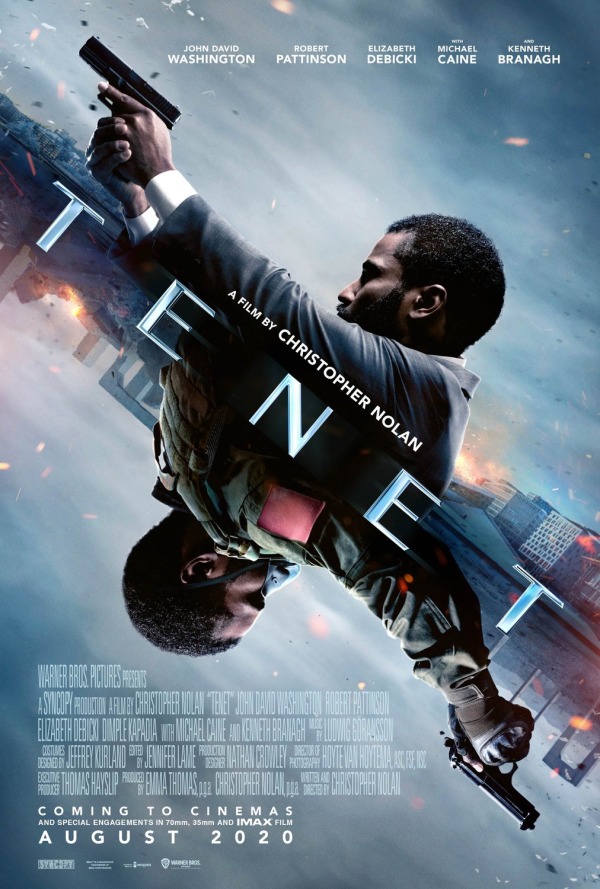TENET (Directed by Christopher Nolan, 150 minutes, USA, 2020)
![]() BY DAN TABOR FILM CRITIC After months of delays,Tenet, the latest epic from blockbuster auteur Christopher Nolan finally hits theaters this week.The film that many hoped would kickstart theaters after the pandemic has been up until this point shrouded in secrecy. I was given the chance to review it for Phawker, but only if I viewed it in a theater, of course. Nolan is all about the theatrical experience and like the rest of his catalog, this film benefits from being projected as loud and big as humanly possible. While I was at first understandably hesitant to watch a film in a room full of people, this was to be a critic screening limited only to press, which for the KOP IMAX theater gave everyone plenty of space. Masks were also enforced, and to be worn throughout the duration of the film, so I felt comfortable finally making my return to the theater.
BY DAN TABOR FILM CRITIC After months of delays,Tenet, the latest epic from blockbuster auteur Christopher Nolan finally hits theaters this week.The film that many hoped would kickstart theaters after the pandemic has been up until this point shrouded in secrecy. I was given the chance to review it for Phawker, but only if I viewed it in a theater, of course. Nolan is all about the theatrical experience and like the rest of his catalog, this film benefits from being projected as loud and big as humanly possible. While I was at first understandably hesitant to watch a film in a room full of people, this was to be a critic screening limited only to press, which for the KOP IMAX theater gave everyone plenty of space. Masks were also enforced, and to be worn throughout the duration of the film, so I felt comfortable finally making my return to the theater.
Tenet is the story of “The Protagonist,” no really, that’s his name. Played by John David Washington (son of Denzel) who we last saw in Spike Lee’s BlacKkKlansman. The film opens with a CIA mission that goes horribly wrong when “The Protagonist” is captured and chooses death over selling out his comrades and swallows a cyanide capsule. He miraculously wakes from “death” sometime later, only to find he was actually recruited by a mysterious organization called Tenet, and the whole cyanide capsule episode was simply a loyalty test. John’s character is tasked with tracking down the source of metal that has been “inverted,” so it flows through time backwards. For instance, if a bullet was made of this material, it would shoot back into the gun tearing backwards through its target rather than forward. After meticulously setting the logic for the film’s take on temporal navigation, Nolan spends the next two hours slowly unraveling these rules as the narrative chooses spectacle above all else.
The mysteries of time is the thematic throughline that spans Nolan’s filmography. This time he tackles time travel. Now keep in mind, the films that convincingly employ time travel as a plot device, and keep audiences engaged, are the ones that simplify it and stick to their established rules. After getting our feet wet with the whole inverted object McGuffin hunt we start on, the film then keeps adding elements and theories until it goes full on Back to the Future in the second act. At this point the film becomes a muddled and dense mess that will no doubt confuse and confound most, as we are tasked with contending with past and present versions of our lead characters. By the third and final act, Tenet feels like a masturbatory exercise as the director throws any and all logic out the window in the name of some of the most breathtaking action set pieces ever committed to film, which I can almost get behind.
Thanks to Spike Lee I know John David Washington isn’t a bad actor, but he just doesn’t hook into the Nolan cadence here, he feels stilted and uncomfortable in his performance. Nolan also tries and fails miserably to employ comedic one-liners at various points in the script, through Washington’s character, in an attempt to offset some pretty disturbing scenes of domestic violence. Speaking of which, Elizabeth Debicki sadly spends the majority of the film, as nothing more than the damsel in distress, or an object to be fought over as “The Protagonist” and her abusive, inverted arms dealer husband battle over her fate. The only winner here is Robert Pattinson, who excels in Nolan’s world. He quickly eclipses “The Protagonist” as his partner Neil, who seems to know much more than he lets on.
Dense and pretentious, Tenet will irritate even the most dedicated Nolan fans with its curiously flawed similarities to Inception. This film desperately wants to be clever but instead comes off as frustrating and confusing as it sacrifices the director’s trademark grounded logic that usually make his films fantastical yet plausible. Still the film is visually stunning and its approach to its inverted action sequences are worthy of the hype. But I honestly think the script should have probably baked for a few more years to hone the film’s chronology a bit more and iron out some of the rough dialog that Nolan himself has seen fit to obscure with overly aggressive sound design. Tenet is arguably the weakest link in Nolan’s otherwise stellar filmography, and serves as further proof of the old adage that all directors try to make the same film over and over again with steadily diminishing returns.

